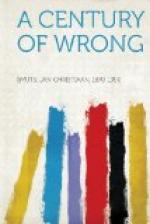“This Government does not wish to pass over in silence the censure which has been passed by Her Majesty’s Government on the Public Prosecutor of Johannesburg, by whom the prosecution of this case was conducted; the fact that being of pure English blood, that he received his legal training in London, that he is generally respected by the Uitlander population on account of his ability, impartiality, and general character, will naturally not be of any weight with Her Majesty’s Government against the facts of his action in calling witnesses for the prosecution who were intended for the defence, and thus rendering an imaginary cross-examination abortive.
“This Government only wishes to point out that the fact that the Edgar case is the strongest which Her Majesty’s Government has been able to quote against the administration of Justice in this Republic affords the strongest and most eloquent proof possible that, taking it in general, the administration of Justice on the gold fields of this Republic not only compares favourably with that on other and similar gold fields, but even with that of old and settled countries.
“The untrue representations of this occurrence in the Press prove conclusively that the newspapers of the Witwatersrand, the atrocity-mongering tactics of which constitute a share of the organised campaign against the Republic and its Government, have been compelled to resort to mendacious criticisms on imaginary instances of maladministration, which were often simply invented. Where the Press is forced to adopt such methods, the true grievances must of necessity be unreal.”
[Sidenote: c. The Amphitheatre occurence.]
I now give Mr. Chamberlain’s accusations about The the Amphitheatre occurrence:—[47] “Some light upon the extent to which the police can be trusted to perform their delicate duties with fairness and discretion is thrown by the events referred to by the petitioners, which took place at a meeting called by British subjects for the purpose of discussing their grievances, and held on the 14th of January in the Amphitheatre of Johannesburg. The Government were previously apprised of the objects of the meeting, and their assent obtained, though this was not legally necessary for a meeting in an inclosed place. The organisers of the meeting state that they were informed by the State Secretary and the State Attorney that anyone who committed acts of violence or used seditious language would be held responsible, and in proof of the peaceful objects of the meeting, those who attended went entirely unarmed, by which it is understood that they did not even carry sticks. So little was any disturbance apprehended that ladies were invited to attend, and did attend. Yet, in the result, sworn affidavits of witnesses of different nationalities agree in the statement that the meeting was broken up almost immediately after its opening, and many of the persons attending it were violently assaulted by organised bands of hostile demonstrators, acting under the instigation and guidance of persons in Government employ, without any attempt at interference on the part of the police, and even in some cases with their assistance or loudly expressed sympathy.




